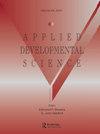老龄化悖论:社会网络类型对中年和老年人心理健康的不同影响
IF 1.7
3区 心理学
Q3 PSYCHOLOGY, DEVELOPMENTAL
引用次数: 0
摘要
本研究基于反映社会关系结构、功能和质量的多个指标,确定了网络类型,并调查了两个年龄组的网络类型与心理健康的关系。使用620名韩国中老年成年人,对总样本和每个年龄组分别进行了潜在剖面分析(LPA)。LPA衍生出四种网络类型:多元支持型、家庭关注型、朋友关注型和受限型。然而,对于每个年龄组,网络类型的流行程度和构成有所不同。在控制个体人口统计信息和自评健康的情况下,四种网络类型之间的心理健康存在显著差异,个体的网络类型成员与他们的心理健康显著相关。尽管网络类型与心理健康的关联在两组中总体上相似,但网络类型对心理健康影响的效应量在老年人中比在中年人中要大得多。本文章由计算机程序翻译,如有差异,请以英文原文为准。
Paradox of aging: Differential effects of social network types on mental health in midlife and older adults
This study identified network types based on multiple indicators reflecting the structure, function, and quality of social relationships, and investigated their associations with mental health in two age-groups. Using 620 South Korean middle-aged and older adults, Latent Profile Analysis (LPA) was conducted for both the total sample and for each age-group separately. LPA derived four network types: diverse-supported, family-focused, friend-focused, and restricted. However, for each age group, the prevalence and composition of the network types differed. While controlling for individuals’ demographic information and self-rated health, there were significant differences in terms of mental health among four network types, and an individual’s network type membership was found to be significantly associated with their mental health. Although the associations of network types with mental health were overall similar in both groups, the effect sizes of network type impact on mental health were much greater in older adults than they were in middle-aged adults.
求助全文
通过发布文献求助,成功后即可免费获取论文全文。
去求助
来源期刊

Applied Developmental Science
PSYCHOLOGY, DEVELOPMENTAL-
CiteScore
12.00
自引率
2.60%
发文量
23
期刊介绍:
The focus of this multidisciplinary journal is the synthesis of research and application to promote positive development across the life span and across the globe. The journal publishes research that generates descriptive and explanatory knowledge about dynamic and reciprocal person-environment interactions essential to informed public dialogue, social policy, and preventive and development optimizing interventions. This includes research relevant to the development of individuals and social systems across the life span -- including the wide range of familial, biological, societal, cultural, physical, ecological, political and historical settings of human development.
 求助内容:
求助内容: 应助结果提醒方式:
应助结果提醒方式:


